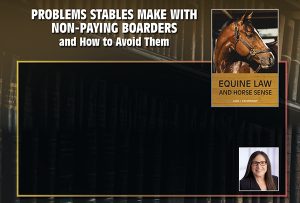
Problems Stables Make With Non-Paying Boarders and How to Avoid Them
Click here to read the complete article
228 – May/June, 2023
 By Julie I. Fershtman, Attorney at Law · www.equinelaw.net
By Julie I. Fershtman, Attorney at Law · www.equinelaw.net
Virtually every trainer, boarding stable, and breeding farm has encountered the problem of horses left in their care without payment. Unfortunately, these businesses sometimes make wrong assumptions about their rights and legal responsibilities. Wrong assumptions can lead to bad decisions, multiple lawsuits, and even criminal proceedings. This article discusses mistakes stables sometimes make in these situations and offers ideas for avoiding them.
Never Assume You Can Sell The Horse Your Own Way And On Your Own Time
Faced with past-due board problems, stables have been known to sell off horses and pocket the proceeds without approval from the non-paying horse owners. Situations like these are ripe for legal trouble for reasons that include:
Stablemen’s lien laws – Most states have stablemen’s lien laws (sometimes called “agister’s lien laws”) that require stables to follow specific procedures before they can sell off horses belonging to others for unpaid board. Over the years, this author has written about these laws and how they differ around the country. Depending on the law, procedures can be complicated and expensive to pursue. Before selling a horse due to non-payment, stables would be wise to consult with a knowledgeable lawyer to understand the applicable law.
Civil suits for depriving the non-paying owner’s property rights – Selling off horses without proper advance permission from the owners is an invitation for trouble on a few fronts. Non-paying horse owners might sue the stable, claiming it “stole” or converted their horse without permission. Depending on the law, consequences can be harsh. For example, lawsuits might claim conversion and seek up to three times the value of the horse, plus the non-paying boarder’s legal fees and costs.
Criminal charges for theft – Potentially, the police and prosecutor’s office might take interest in pursuing criminal charges against a stable or trainer that sold off a boarded horse without permission.
Lawsuit from the buyer – A hasty sale to relieve a stable of a horse with unpaid board could generate litigation from the buyer. That is, a disgruntled buyer might sue the stable challenging its sale on the basis that the stable lacked clear title. A buyer might also challenge the sale because the breed registry won’t transfer the registration papers.
Never Assume You Can Tack On Any Rate Of Interest
Click here to read the complete article
228 – May/June, 2023

Recently Added
- My Life Between The Reins – A True Story Feature by Marilyn Swick May 2, 2024
- Heading to the 76th National Appaloosa Show and Youth World Show? May 2, 2024
- Potomac Horse Center Permanently Closing May 2, 2024
- Happy Birthday, Andrea Kail! May 2, 2024
- EC Photo of the Day – Chase Rudd & Cool Rumerz May 2, 2024
- Around the Rings – Results for A Sudden Impulse and Orange Blossom Classic 2024 May 2, 2024
- 2025 AQHYA World Show Qualifying May 2, 2024
- The National Snaffle Bit Association Welcomes Newest Quarter Million Dollar Riders May 2, 2024
- EC Photo of the Evening – 2024 Euro Summit Circuit Netherlands May 1, 2024
- 2024 NSBA World Championship Show Stalls and Entries Online May 1, 2024
Archives
Sign In
Equine Chronicle ® All Rights Reserved. Copyright © 2024
4727 NW 80th Ave. • Ocala, FL 34482 • 352 369 1104 • FAX 352 369 1521
Privacy Policy | Questions, please contact The Equine Chronicle
-








